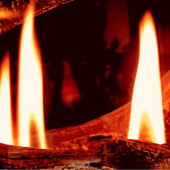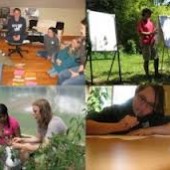
This piece explores the author’s relationship with fire (domestic fire and wildfire) and the lessons inherent in a rural life that is both dependent on fire and threatened by it. It explores the curriculum of fire as one of nonattachment, of community cohesion, of the legacy of colonialism and of the connection to place.
Continue Reading
To live up to UNESCO’s definition of a sustainable development education that empowers youth with the knowledge, attitudes, motivations, commitments, and skills to solve and prevent the world’s total environmental problems, youth must be able to find meaning in the curriculum based in their own experiences and expanded through shared group experiences. An environmental-based experiential curriculum with a positive development focus can help youth reclaim their learning process and reconnect with their communities. However, without critical analysis, students, especially marginalized students, cannot develop the tools and competencies to truly understand their environment and their place within it. Linking environmental and experiential education with critical theory provides students the opportunity to develop their leadership and gain the social and cultural literacy skills needed to come in from the margins.
Continue Reading